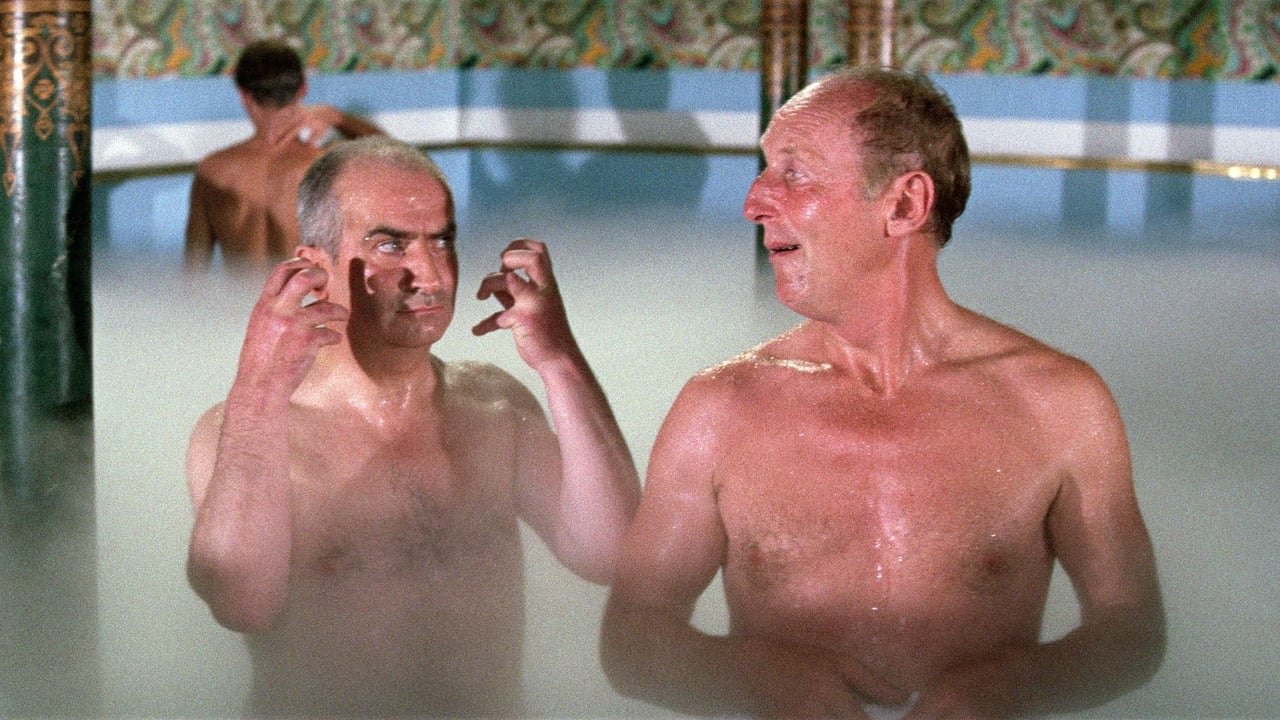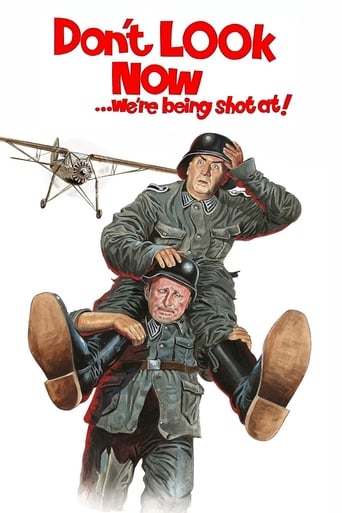

Comedies age. All things age actually, films included, comedies included. Seeing 50 years later a film that you remember having laughed at until falling under the chair (this is a Romanian expression, I hope it's clear what it means) is risky. The experience was interesting and surely much different.Filmed in 1966, a little more than 20 years after the end of WWII, Gérard Oury's La Grande Vadrouille represents a certain step in the evolution of the French (and not only French) films about the war that devastated Europe and the whole world. Taking distance and starting to allow ridicule replace at least in part hate and contempt for the German former enemies was not a completely new thing, I can remember Christian-Jaque's Babette Goes to War which preceded it with seven years. Yet, in this story about three British airmen parachuted in occupied Paris and saved by a band of French civilians including a famous music conductor (Louis de Funès), a humble paint-man (Bourvil) and a blue-eyed blonde puppeteer (Marie Dubois) the enemies are still all bad and stupid. It will take a time for the 'good German' to show up in war movies and even more time for the cinematographic acknowledgment of the collaboration with the occupiers. Meantime all French are good guys. Or good girls. Or good nuns.The film enjoyed huge success, it was actually from its release until 2008 the most successful French film of all times. I remember having seen it in the late 60s in Romania, and I read about film fans from China for example enjoying it as a huge success after the end of the Cultural Revolution. To a large extent the success is due to the presence on screen of the two greatest comedy actors of the French cinema at that time - Louis de Funès and Bourvil. Both were huge stars and Gérard Oury had brought them together on screen in a previous film, and now wrote the scenario of La Grande Vadrouille especially for them. Most of the time they are together on screen and the comic qualities of the two enhance each other, the chemistry between them is obvious and so is the pleasure of acting. Years have passed and I did not fall under the chair any longer, laughs turned into smiles and nostalgia, and I can also see the naivety of the script and the schematic story line - but it's certainly mostly me. The two are again together in my mind, at least for the next 50 years.
... View MoreThe undeniability of "The Great Stroll" as the greatest French comedy has somewhat been shaken by the passing of half a century and a few trivia facts. The film held the record of the highest-grossing French movie for forty-two years before being dethroned by "Welcome to the Chti's" and "Intouchables". And since humor is a very fluctuating element of human perception, I suspect a larger portion of French population wouldn't call "The Great Stroll" the greatest French comedy of all time. But they couldn't be more wrong. Indeed, "The Great Stroll" is to French Cinema what "Some Like it Hot" is to Hollywood, kids might laugh at Seth Rogen or Jonah Hill, their parents might miss the National Lampoon or Jim Carrey's movies, and their grandparents some Lewis and Martin or Abbott and Costello films, but Billy Wilder's classic is the one to reconcile all generations. That's "The Great Stroll" effect, there's something just timeless about this film, maybe because it is set in world war II, a page of History that still fascinates the younger generation, or because it reunites two immortal comedic icons, directed by a man who had a flair for good comedy, or just because it is one of these instances where you got the right cast with the right story and the right timing: it just can't fail even if it tried to.And it sure didn't, 17 million viewers is still an honorable score by today's standards especially at a time where French population was one-fourth smaller and when there was no Internet, not even TV publicity to create the buzz. But "The Great Stroll" was beyond these needs, it was reliant on the popularity of two great comedians and only their talent ensured a positive word-of-mouth that and the success of their previous pairing in "The Sucker". No one knew how it was going to work, their acting styles were as opposite as their body frames but they completed each other as if they've been a duo for years. "The Sucker" met with success although Bourvil and De Funès were seldom on the same scene, but the test was conclusive and proved Oury that time had come for these two 'messieurs' to share the screen a little longer than that."The Great Stroll" didn't miss that opportunity and as soon as the two men are put together, it's the beginning of a great buddy-movie through France in the midst of the German Occupation. But Oury isn't in a rush, it takes almost half an hour before the two leads meet because the priority is to tell a story, gags will flood naturally. So we have three English paratroopers escaping from German anti-aircraft defense to find themselves flying over Paris, the commander, spotting a generous mustache orders everyone to leave the plane and meet in the Turkish bath, their code is "Tea for Two". The man lands on the famous Vincennes' Zoo, the two others cross the paths of municipal painter Augustin Bouvet (Bourvil) and hot-tempered opera conductor Stanislas Lefort (Louis de Funès). Despite their initial reluctance, they help the British aviators and go to the rendezvous in the' hammam, which leads to the first classic scene when both men whistle "Tea for Two" making eyes with the one big mustached man wondering what on earth is going on. Finally, the historical encounter happens through a hilarious exchange of involuntary homoerotic subtext. Bourvil and De Funès stare at each other, with a weird glee on their eyes, and say : "are you?" "you are". At that moment, the story takes off, driven by the eternal contrast between the blue-collar simpleton and the pedant educated man. De Funès is so odious and bossy that poor Bourvil can't help but obey such orders as giving his shoe, his bike and his shoulders, his awkward walking with tight shoes and his pathetic protests became the most defining traits of his 'lovable loser' character. "The Great Stroll" doesn't overstuff the film with gags but narrates a genuinely touching adventure of two Frenchmen who overcome their weaknesses and act with bravura and humanity. And what a lesson for today's advocates of political correctness that people who lived during the war, much more Oury, a Jewish director, had no problem ridiculing the Nazis and even showing them playing musical chairs in one of the film's most defining sequences. Indeed, this is a comedy that is not trying to make a political statement whatsoever; it has no other intent than making you laugh. But as a way to acknowledge the gravity of the context, there are two dramatic moments where each of the two men save one's life from a German patrol and gets a "thank you". Drama isn't gratuitous as it allows the bond between the two men to grow into friendship. And on their own, each one gives his personal little touch, Bourvil is in love with the beautiful Marie Dubois and provides that bit of tenderness, while De Funès' struggle with his wig or the snoring of an overweight Nazi officer provides the slapstick. The film works on many levels, it has action, tenderness, screwball comedy and instinct. Indeed, the most memorable sequences was ad-libbed. Instead of falling on Bourvil's shoulders and then on the ground, De Funès simply stays on the shoulders and lets Bourvil carry him. It is not just the most defining moment of the film, but of French cinema, the two giants, writing a page of French cinema's history. And "The Great Stroll" is carried by the two performances as confidently as Bourvil carried De Funès' on his shoulders, without letting him fall. Oury would write the "Delusion of Grandeur" with the two men in mind, but Bourvil's passing in 1970 deprived French cinema from what could have been a great trilogy. We'd have to 'content' ourselves with "The Great Stroll" which is simply French comedy's finest hour.
... View MoreIt is true that in recent times many French films (Bienvenue Chez Les Ch'tis and Les Intouchables) are breaking box office records in France but the importance of "La Grande Vadrouille" cannot be neglected. It was the first major box office success which treated the serious theme of war in a light manner. Its significance to French culture and civilization continues to grow with the passage of time as it is a perfect film which can be shown to students learning Molière's language "French". About war, it is said that when one has common enemy, one has to forget individual difference to defeat the common enemy. The entire film is based on this statement. French actor Bourvil remains an important element of this film. His performance as a simple man in love remains this film's key element of attraction. Lastly, Gérard Oury has given a humane face to the theme of war in his film as it depicts how ordinary Britons and French collaborate wisely in order to get rid of cruel Germans.
... View MoreThis film is associated to personal memories of holidays with family. My father used to take me with him to watch war films in the 1960s, and this film starts as if it is yet another serious war film. However, this lasts only one or two minutes, and the rest is a fantastic series of good quality gags that strike a perfect balance between the humour of its fable and the fearsome echo of the disastrous war.I particularly enjoyed seeing the effect of this on my father, who I have rarely seen enjoying himself as much as when he was watching "tre uomini in fuga" (the Italian title). We used to see a film or two per summer with many friends, and we went to see this in at least 3 or 4 years as this was the best of all the films we saw in those years.
... View More